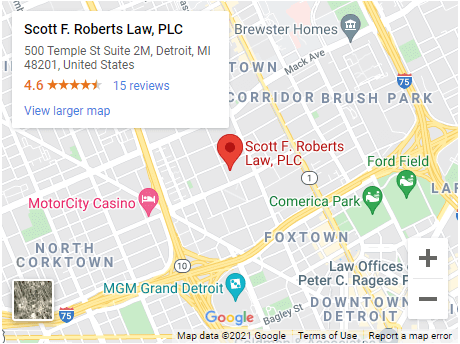So you’ve decided you want to enter the Michigan cannabis industry. Maybe it’s because its one of the state’s fastest growing industries, or maybe you think it would be a fun and exciting industry to become a part of. Where do you start?
Before getting started, it it’s important to talk about what laws actually govern legal cannabis businesses in Michigan. There are three main marijuana laws—the Michigan Medical Marihuana Act, or “MMMA”; the Medical Marihuana Facilities Licensing Act, or “MMFLA”; and the Michigan Regulation and Taxation of Marihuana Act, or “MRTMA.” The MMMA authorizes “caregivers” to grow up to 12 plants per registered patient, for a maximum of 72 plants, but does not authorize the sale of marijuana except to the caregiver’s registered patients. The MMFLA, on the other hand, allow for the licensing of medical marijuana businesses and allows dispensaries to sell to any registered patient, including out-of-state patients in some cases. Finally, the MRTMA, or “adult-use” licensing law, allows for the licensing of recreational marijuana businesses and the sale of marijuana to anyone 21 years and older.
In this article, we will walk you through the steps you need to take in order to start a legal Michigan marijuana business. As a Michigan cannabis business attorney, we work with both licensed “plant touching” companies as well as cannabis companies that do not require an MMFLA or MRTMA license.
Step 1: Choose Your Niche
The very first decision you will have to make is what exactly you want to do in the industry. Do you want to start a commercial cultivation facility? Do you want to open a dispensary? Or do you want to simply take your existing business or skill set and pivot it to helping other cannabis companies? Here, we will divide up industry opportunities into three different tracks—branding and licensing, ancillary businesses, and plant-touching.
Branding and Licensing
Not many people know that you can sell your own branded marijuana and marijuana products without ever having an MMFLA or MRTMA license. Many of the brands that you see when walking into a Michigan dispensary are not actually licensed companies. Instead, they have licensing / white labeling agreements with a Michigan licensed cannabis processor to manufacture their products. You may be surprised to learn that most of the brands you see on a dispensary’s shelf are manufactured in one of a handful of processing facilities throughout Michigan.
What that means is that you could launch your own cannabis brand, whether that be flower, cartridges, edibles, etc., without the immense start-up costs of obtaining a Michigan cannabis license under the MMFLA or MRTMA. What you will need is an lawyer with experience in negotiating cannabis licensing and white label deals, some start-up capital, and a very persuasive business plan or pitch deck. You don’t need to be a celebrity to start a cannabis brand—in fact, celebrity brands don’t have the best track record in this industry. What you do need is good branding concept, and most importantly, the work ethic and marketing budget to build that brand into a household name. I work with several such companies, and let me tell you, it’s much easier said than done, but that doesn’t mean it’s not possible.
Ancillary Services
While there is lots of opportunity in cultivation, processing, dispensaries and other “plant touching” businesses, there is also opportunity in the ancillary business sector. This was the path that I initially chose. I had worked in business, real estate and healthcare law prior to 2017, and saw the opportunity to pivot my law firm to servicing cannabis companies. In truth, it wasn’t all that much of a change, I just changed the type of clients I was going after but was still doing pretty much the same work. Similarly, you may have an existing skill, service or business that could be pivoted to the cannabis industry. Maybe you are an accountant, insurance agent, real estate broker, general contractor, or have some other professional skill that can be easily translated into the industry. If so, then your easiest path to having a legal marijuana business is to simply pivot your existing business to service the cannabis industry.
Even if you don’t have a directly translatable professional skill, there are other ways to enter the cannabis ancillary services market. There are thousands of opportunities to break into the Michigan cannabis industry via ancillary services and products. You could develop an app such as WeedMaps, you could manufacture smoking accessories such as dab rigs, or provide some other product or service. Similar to the licensing and branding path, one of the big advantages of ancillary services is that you don’t need to go through the expensive and time-consuming task of obtaining a cannabis license.
Plant-Touching
“Plant-touching” is industry lingo that refers to a business that, you guessed it, actually touches the marijuana plant. In Michigan, that refers to cannabis cultivation, dispensaries, processors , safety testing labs, secure transporters, and microbusinesses. We will also include cannabis lounges and cannabis events in this category due to the fact that Michigan requires them to obtain an MRTMA license.
While potentially the most lucrative, plant-touching cannabis businesses are expensive to start-up and require you to go through an extensive and time-consuming licensing process, as outlined below as well as here.
Step 2: Put Together a Business Plan, Budget, and Pro Forma
Before forming your business, you want to first put together a solid cannabis business plan with a start-up budget and pro forma numbers. Even if you are self-funding and don’t need investors or financing, it is still a good idea to put your business plan to paper and fully flesh out your business model.
One of the most common mistakes in the Michigan cannabis industry is the failure of business owners to properly budget their projects. A dirty little secret of commercial real estate is that you can pretty expect your project to go over-budget. You need to account for this fact from the beginning, especially since cannabis projects, particularly cultivation facilities, are notorious for going well over budget. We commonly recommend adding a 15% contingency to any construction budget to account for expected cost overruns, though sometimes even this number isn’t enough.
Another common mistake is to assume that your business will be profitable from day 1. This is almost never the case. Whether you are a dispensary, and need time to build a customer base, or a grower that needs time to get their first crop and work out the kinks in their cultivation system, do not count on being profitable from the outset. When building your budget, that means remembering to account for sufficient operating capital to allow you to survive until you reach the point of profitability.
Step 3: Form Your Business and Choose Your Team
Now that you’ve chosen your niche and have a plan, the next step is to form your company and choose your team. There are many considerations to take into account when selecting your business structure. While forming LLCs and corporations is incredibly easy in Michigan, selecting your team and properly structuring your company are not quite as easy. For plant-touching companies, you will at a minimum need a cannabis business attorney and accountant who specializes in cannabis. You will probably want to set up consultations with several professionals and companies providing these or other services before choosing the right attorney or accountant for your project.
When selecting your cannabis business attorney, make sure you select a firm with both a cannabis and business law background. There are numerous “cannabis attorneys” with criminal law backgrounds instead of business law backgrounds. Instead, you will need an attorney with corporate formation, structuring, real estate and contracting experience who also has experience representing cannabis businesses. This will ensure your company is properly structured and protected from the beginning.
Depending on your own skill set, knowledge and experience, you may also need to identify additional partners, employees, or cannabis business consultants. to help fill out your team. For cultivation projects, this usually means selecting the master grower; for safety testing, the right person to run the lab; and so on.
This is also the time to decide how to structure your cannabis business. When drafting an operating agreement or setting up a corporation’s bylaws, you will need to decide how the business will actually be run. In deciding this, you will need to be prepared to answer a lot of questions. For example, will you need to bring on investors? Are you splitting up responsibilities within the company with your team? If you have partners, how are major decisions going to be made? What’s the best tax status for your business?
The answers to these questions will decide what type of company you want to form, how it will be managed, and what tax selections you will want to make. It is important that you put sufficient time and energy into this step since incorrectly structuring your company can lead to headaches, lost profits, and potential litigation down the road.
Now, if you are not a plant-touching company, you can skip right to Step 7. If you are a plant-touching company, however, you will also need to go through the next steps to properly license your company with the Michigan Marijuana Regulatory Agency, or “MRA.”
Step 4: State Prequalification
And now the fun begins! Unlike other states such as Illinois or Florida, Michigan doesn’t put limits on the number of state cannabis licenses that can be issued. That means that anyone who can pass the state’s background check and obtain a municipally licensed property can receive an MMFLA or MRTMA cannabis license.
Luckily for cannabis business owners, the state has been loosening up on the qualifications for owning a Michigan cannabis business. The state no longer requires financial statements, real estate deeds, or three years of taxes. The state is also no longer hyper-focused on criminal matters as it once was. Instead, MRA’s main focus appears to be on taxes, business litigation, regulatory history, and bankruptcy. What this boils down to is whether you have a history of paying your taxes, whether you have any outstanding tax liens or deficiencies, whether you’ve had issues with other governmental licenses, and whether you’ve engaged in unethical business practices such as refusing to pay money you owe or engaging in fraudulent activities.
At Scott Roberts Law, we’ve submitted well over a hundred prequalifications, and can help you identify and overcome potential licensing issues. With respect to multi-partner groups, sometimes this means leaving someone off of the license due to issues in their background, and instead having them control or finance the real estate or equipment. In other situations, it may simply mean getting ahead of certain issues and providing your side of the story in the form of a cover letter to your application. While each situation is different, we recommend you talk to a Michigan cannabis licensing attorney before submitting your MMFLA or MRTMA prequalification.
Step 5: Identify and Municipally License Your Cannabis Property
While your prequalification is in process, it’s usually a good idea to start looking for property to locate your cannabis facility. Under the MMFLA and MRTMA, whether and where you can locate your cannabis business is up to each individual municipality. Unfortunately, most Michigan municipalities do not allow licensed cannabis companies to operate within their borders.
Nonetheless, there are a number of Michigan municipalities that will allow you to legally operate a licensed cannabis business, including Detroit, Warren, Lansing, Grand Rapids, Pontiac, Flint, Traverse City, and others. An unofficial list of municipalities that allow cannabis businesses can be found here.
There are many different routes you can take to acquire a municipally licensed cannabis property. You can purchase the property or lease it. You can also purchase the property on a land contract, which is generally referred to in the industry as “terms.” Unlike other industries, land contracts are wildly popular in the cannabis industry, given the lack of banking and lending options for cannabis businesses.
You can also purchase property with a municipal cannabis license or existing cannabis business, or obtain your own license. Generally, properties that already have licenses attached garner a premium compared to properties that are merely eligible for licensing, and both garner a substantial premium when compared to properties that are not eligible for cannabis licensure. For properties that do not already come with a license, you should be able to “tie up” the property with a purchase agreement or contingent lease while you obtain your municipal license. Otherwise, you could end up paying a premium for a property that you cannot use for your business.
Many municipalities “cap” the number of licenses they allow for specific facility types, and there may be a limited window to apply for these limited number of municipal licenses. Most municipalities will cap the number of dispensary (also referred to “provisioning center” and “retailer”) licenses they allow, though some also cap the number of growers, processers, and other license types. Thus, even if you find a property in a municipality that allows cannabis and is properly zoned, you also need to make sure the municipality is actually accepting applications for your license type.
Step 6: State Facility License
Now that you are prequalified and have a municipal license, the next step is to build out your facility and apply for a state operating license. MRA recommends waiting until you are less than sixty days from being fully built out for operations before applying for the “Step 2” or “Part 2” cannabis facility licensing step with the state.
Applying for a final state operating license requires you to put together a number of plans to submit to the MRA, from recordkeeping plans, security plans, staffing plans, advertising plants, and more. You will also need to submit to inspection by MRA as well as the Bureau of Fire Services, or “BFS.” Once your Step 2 packet is approved, and you have passed MRA and BFS inspection, the last step in the process is to pay the licensing assessment fee, which varies by license type. Once paid, MRA will issue you an MMFLA or MRTMA license and you can begin operations!
Step 7: Execute!
Now that you have gone through the process to legally start up a cannabis business in Michigan, you need to execute on your business plan. If you are properly funded and have a rock-star team of employees, consultants and / or partners, you are set up for success. However, as many business owners can attest (including myself), running a business is not as easy or as sexy as it looks. For plant touching companies, maintaining compliance with the ever-changing regulations and guidance applicable to the Michigan cannabis industry is tough.
You will certainly face obstacles, some of which are outlined below, and you almost definitely won’t be an overnight success. I sometimes joke that it took my three years in the industry to be an “overnight success.” But with the right funding, team and lots of hard work, you can have a successful, and legal, cannabis business here in Michigan.
Step 8: Overcoming Obstacles on Your Road to Success
Let’s be honest, if it was easy to start a legal cannabis business in Michigan, everyone would do it. But the business opportunities the Michigan cannabis industry presents are especially attractive not because it’s an easy business to get into, but because it’s can be quite difficult. The stakes are high, and the competition can be fierce. There are likely hundreds of companies vying to be the next Weedmaps, and we’ve seen situations where there are dozens of cannabis companies going after only a handful of available municipal licenses.
Don’t be afraid of this sort of competition, just be prepared. The market is big enough for there to be numerous profitable and successful companies in your niche, whether that’s cultivation, branded products, or professional services. The big winners are not always the ones who are first to market. Oftentimes, the most successful companies are defined by their ability to overcome the inevitable obstacles that operating in the cannabis space can present. We will go through several common obstacles faced by cannabis businesses below.
Banking and Insurance
It’s a common misconception that the cannabis industry is an all cash business. Every single cannabis company I represent, including both plant-touching and non-plant touching, has a bank account and access to most insurance products. There are now at least 5 Michigan banks and credit unions that will openly bank licensed, plant-touching cannabis businesses. Even more will bank ancillary cannabis companies, though ancillary businesses still have to be careful. Similar to banking, insurance is also widely available for cannabis businesses. As the registered agent on dozens of prequalified or licensed cannabis businesses, my mailbox is absolutely inundated with insurance agents offering insurance to cannabis businesses.
Nonetheless, until the cannabis becomes legalized or Congress passes of the Safe Banking Act, banking in the cannabis space will be limited, and expensive. Michigan cannabis banks and credit unions will generally charge a hefty due diligence fee, thousands of dollars in monthly maintenance fees, and sometimes an additional fee based off the percentage of total deposits. It is therefore a good idea to shop around and find the bank or credit union that is best for your situation. If you have a high volume business, you may be better off with a bank that charges a higher monthly maintenance fee but no deposit fees, or vice versa.
Funding
One of the biggest obstacles in starting a licensed cannabis business is obtaining enough money to get off the ground. Because of the fact Cannabis remains federally illegal, almost no banks will lend to cannabis businesses, with the exception of a few that bank cannabis and lend only up to a few hundred thousand dollars in property-backed loans.
For cannabis entrepreneurs, that usually means they either need to self-fund their business, bring on investors or obtain financing from a private, non-bank institutional lender. Raising capital from investors is not an easy task, even with the outsized returns some opportunities in the industry can offer. For this reason, many new cannabis businesses prefer to start small and then gradually scale up by reinvesting their profits back in the business. This also has the advantage of making it easier to raise capital, since growing companies with a good operational history are much more attractive to investors than pie-in-the-sky start-ups.
Private lending is also available to cannabis businesses, just be prepared for incredibly high interest rates. Even real estate backed loans, which is the most common type of lending in Michigan’s cannabis industry, can easily have interest rates between 10-15%. Equipment loans for start-ups are particularly hard to come by, as are operating loans. Hopefully this will change, and loan programs like the SBA will start allowing loans to cannabis businesses, but until that time, obtaining financing for your business is no easy task.
Taxes
While non-plant touching businesses generally have it easy when it comes to taxes, plant-touching businesses need to familiarize themselves with what’s commonly referred to as “280E.” 280E is a section of the federal tax code that prevents plant-touching cannabis businesses from taking most of your standard business deductions. Taking into account the effects of 280E when structuring your business is highly recommended and can be the difference between turning a profit or suffering a loss.
Real Estate and Construction
For plant-touching companies, the biggest obstacle and biggest bottleneck in opening a licensed cannabis business in Michigan is finding cannabis real estate, getting it licensed, and getting it built out and properly equipped, especially when it comes to cultivation facilities and dispensaries. Most of your start-up budget will be dedicated to this process. Like any business, it is important to get this right the first time, because you may only get one shot at it. Selecting the wrong property can tank even the best of business plans. A retail dispensary with little to no foot or car traffic is likely to struggle, and a building not well-suited for cultivation can increase your build out and equipment costs and dampen your yields well into the future.
I’ve seen clients have to replace their entire HVAC system because they miscalculated the expected loads, as well as clients that didn’t take into account the costs of bringing more power to their grow facility. The best advice I can give here is to simply be diligent, and take your time selecting your team and planning your facility. Going with the first architect you find, or first general contractor, is not always a good idea. For every quality contractor or architect in the industry, there is one that overcharges and underdelivers. The best advice I can give is to do your homework, choose carefully, and choose wisely.
Conclusion
With this article, hopefully you now understand the path you will need to go down to start a legal cannabis company in Michigan.
On a personal note, entering the cannabis industry, and pivoting my existing business and real estate law firm to focus on working with Michigan cannabis companies, was probably the best career decision I’ve ever made. Starting your own Michigan cannabis business may very well be the best career decision you’ll ever make.
Just don’t fall into the trap of thinking it will be a walk in the park. You will face obstacle after obstacle. I’ve had my bank accounts and credit cards shut down and had competitors pouch employees. I constantly deal with last minute client emergencies, not to mention a constant stream of late night and weekend calls, texts, and emails. It’s not been an easy path, nor is it an easy way to get rich quick. However, if you want to enter an incredible growth industry, and are not afraid to put in a lot of hard work, entering the Michigan cannabis industry might very well be the best decision you will ever make.




